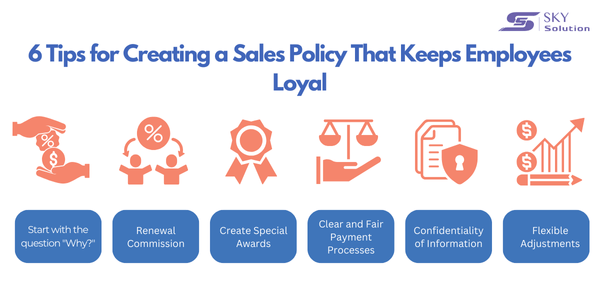In the world of software outsourcing, to build a sales policy is crucial, as the sales team serves not just as a bridge between you and your customers but also as a representation of your brand. So, how can you create a sales team that is not only skilled but also eager to stay with your company for the long term? In this article, Sky Solution will share some lessons I’ve learned from managing my business.
I. Why Is It Important to Build a Sales Policy?
A sales policy is one of the top concerns for sales teams within a company. If the sales policy you implement falls short of your employees’ expectations, it can decrease their job satisfaction. Consequently, if you don’t address this issue properly, your product sales may decline over time.
Additionally, employee dissatisfaction can affect your customers’ and partners’ perceptions, putting your brand’s reputation at risk. In this situation, you will incur higher costs for recruiting and training new staff. High turnover means that your company will spend more on hiring and training new employees, which increases operational costs and diverts resources away from core business activities.
II. 6 Effective Ways to Build a Sales Policy
Here’s a closer look at the key aspects of a sales policy that every company should consider
Combine Base Salary and Commission
You can combine a base salary with a commission structure. Salary that includes a fixed amount along with commission based on sales revenue helps employees feel secure while also motivating them to work harder.
For example, you can establish a tiered commission rate based on sales performance, encouraging employees to exceed their targets. Here’s how it might work:
Salespeople earn commission as a percentage of the contract value for new customers. The commission structure could be:
- Initial Threshold: No commission is earned on sales up to $5,000.
- Tier 1: Sales from $5,500 to $20,000 earn 3% commission.
- Tier 2: Sales from $25,000 to $100,000 earn 4% commission.
- Tier 3: Sales from $110,000 to $250,000 earn 4.5% commission.
- Tier 4: Sales over $300,000 earn 5% commission.
These tiers are intentionally spaced apart to prevent employees from committing fraud to earn a higher commission percentage, which could lead to lost revenue. To address this, create a linear commission increase for revenue that falls between the two tiers.
Renewal Commission
When employees have the opportunity to renew or expand existing contracts, recognizing their efforts through a renewal commission is an effective way to encourage their motivation. This approach not only boosts sales but also strengthens customer relationships.
For example, for every contract renewed with a returning customer, the sales team could earn an additional 1.5% commission on the renewal. Of course, sales employees must genuinely contribute to customer care and encourage clients to continue signing future contracts.
Create Special Awards
Establish reward levels for employees who achieve specific goals, such as closing a large or long-term contract or reaching a set number of renewals within a year. These rewards can include cash bonuses, exclusive perks, travel opportunities, or even company stock.

Clear and Fair Payment Processes
It’s important to remember that clients won’t pay the full contract amount on the signing day; payments are typically made in stages. Therefore, the sales team’s commissions should also be disbursed according to the client’s payment schedule. Moreover, total commissions should be based on the project’s total revenue, not the total contract value, as contracts may be halted for various reasons (e.g., if the client goes bankrupt or decides to terminate the agreement).
Additionally, in a team where multiple people contribute to the sales process—from marketing to technical consulting—ensuring fairness in commission distribution is crucial. Establishing a clear and transparent system helps avoid conflicts and enhances team spirit. Clearly identify who contributed, such as who made contact with the client, who arranged meetings, and who stayed up late to create persuasive presentations. Share the rewards fairly!
Confidentiality of Information
The confidentiality of commission-related information is extremely important. Employees need to feel that their personal and financial information is protected, fostering a work environment based on trust and respect.

Flexible Adjustments
The business world is constantly changing, and sales policies must adapt accordingly. Monitoring the effectiveness of your policies and being prepared to adjust them to align with current business conditions, market shifts, and legal requirements are key to maintaining competitiveness and compliance.
Implementing these essential policy elements will help your company attract skilled sales personnel while fostering a positive work atmosphere where everyone feels appreciated and motivated. This is a solid foundation for building a strong brand in the software outsourcing industry.
III. Conclusion
The key to creating a balanced sales policy is not only to motivate your team with incentives but also to ensure they do not feel overwhelmed or pressured. Whether you’re in the startup phase or have been in the software outsourcing market for a while, developing an effective sales policy is crucial for attracting and retaining talent as well as building a strong brand. Don’t hesitate to invest time and resources into this. A happy sales team not only generates higher revenue but also serves as brand ambassadors in the eyes of your customers.
How do you get started? Remember that careful consideration is essential when establishing and adjusting your policy. Listen to your team, adapt to the market, and always look for ways to innovate. That’s how to build a sales team that not only achieves impressive results but also wants to stay with your company for the long haul. A good sales policy is the perfect start to your success story


